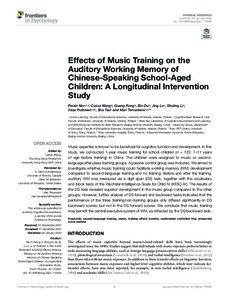Effects of Music Training on the Auditory Working Memory of Chinese-Speaking School-Aged Children: A Longitudinal Intervention Study
Nie Peixin; Wang Cuicui; Rong Guang; Du Bin; Lu Jing; Li Shuting; Putkinen Vesa; Tao Sha; Tervaniemi Mari
Effects of Music Training on the Auditory Working Memory of Chinese-Speaking School-Aged Children: A Longitudinal Intervention Study
Nie Peixin
Wang Cuicui
Rong Guang
Du Bin
Lu Jing
Li Shuting
Putkinen Vesa
Tao Sha
Tervaniemi Mari
FRONTIERS MEDIA SA
Julkaisun pysyvä osoite on:
https://urn.fi/URN:NBN:fi-fe2022081154075
https://urn.fi/URN:NBN:fi-fe2022081154075
Tiivistelmä
Music expertise is known to be beneficial for cognitive function and development. In this study, we conducted 1-year music training for school children (n = 123; 7-11 years of age before training) in China. The children were assigned to music or second-language after-class training groups. A passive control group was included. We aimed to investigate whether music training could facilitate working memory (WM) development compared to second-language training and no training. Before and after the training, auditory WM was measured via a digit span (DS) task, together with the vocabulary and block tests of the Wechsler Intelligence Scale for Child IV (WISC-IV). The results of the DS task revealed superior development in the music group compared to the other groups. However, further analysis of DS forward and backward tasks indicated that the performance of the three training/non-training groups only differed significantly in DS backward scores, but not in the DS forward scores. We conclude that music training may benefit the central executive system of WM, as reflected by the DS backward task.
Kokoelmat
- Rinnakkaistallenteet [29335]
